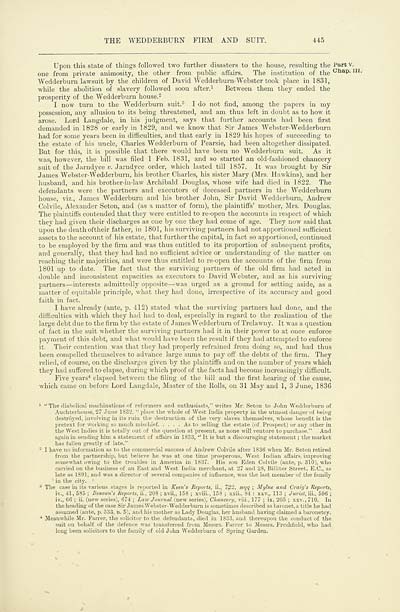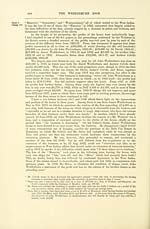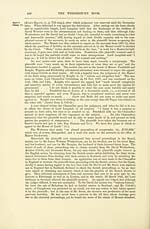Wedderburn book > History
(601) Page 445
Download files
Complete book:
Individual page:
Thumbnail gallery: Grid view | List view

THE WEDDERBURN FIRM AND SUIT. 445
Upon this state of things followed two further disasters to the house, resulting the Part v.
one from private animosity, the other from public affairs. The institution of the cha P- UI -
"Wedderburn lawsuit by the children of David Wedderburn-Webster took place in 1831,
while the abolition of slavery followed soon after. 1 Between them they ended the
prosperity of the Wedderburn house. 2
I now turn to the Wedderburn suit. 3 I do not find, among the papers in my
possession, any allusion to its being threatened, and am thus left in doubt as to how it
arose. Lord Langdale, in his judgment, says that further accounts had been first
demanded in 1828 or early in 1829, and we know that Sir James Webster- Wedderburn
had for some years been in difficulties, and that early in 1829 his hopes of succeeding to
the estate of his uncle, Charles Wedderburn of Pearsie, had been altogether dissipated.
But for this, it is possible that there would have been no Wedderburn suit. As it
was, however, the bill was filed 1 Feb. 1831, and so started an old-fashioned chancery
suit of the Jarndyce v. Jarndyce order, which lasted till 1857. It was brought by Sir
James Webster-Wedderburn, his brother Charles, his sister Mary (Mrs. Hawkins), and her
husband, and his brother-in-law Archibald Douglas, whose wife had died in 1822. The
defendants were the partners and executors of deceased partners in the Wedderburn
house, viz., James Wedderburn and his brother John, Sir David Wedderburn, Andrew
Colvile, Alexander Seton, and (as a matter of form), the plaintiffs' mother, Mrs. Douglas.
The plaintiffs contended that they were entitled to re-open the accounts in respect of which
they had given their discharges as one by one they had come of age. They now said that
upon the death of their father, in 1801, his surviving partners had not apportioned sufficient
assets to the account of his estate, that further the capital, in fact so apportioned, continued
to be employed by the firm and was thus entitled to its proportion of subsequent profits,
and generally, that they had had no sufficient advice or understanding of the matter on
reaching their majorities, and were thus entitled to re-open the accounts of the firm from
1801 up to date. The fact that the surviving partners of the old firm had acted in
double and inconsistent capacities as executors to David Webster, and as his surviving
partners — interests admittedly opposite — was . urged as a ground for setting aside, as a
matter of equitable principle, what they had done, irrespective of its accuracy and good
faith in fact.
I have already (ante, p. 412) stated what the surviving partners had done, and the
■difficulties with which they had had to deal, especially in regard to the realization of the
large debt due to the firm by the estate of James Wedderburn of Trelawny. It was a question
of fact in the suit whether the surviving partners had it in their power to at once enforce
payment of this debt, and what would have been the result if they had attempted to enforce
it. Their contention was that they had properly refrained from doing so, and had thus
been compelled themselves to advance large sums to pay off the debts of the firm. They
relied, of course, on the discharges given by the plaintiffs and on the number of years which
they had suffered to elapse, during which proof of the facts had become increasingly difficult.
Five years 4 elapsed between the filing of the bill and the first hearing of the cause,
which came on before Lord Langdale, Master of the Rolls, on 31 May and 1, 3 June, 1836
1 " The diabolical machinations of reformers and enthusiasts," writes Mr. Seton to John Wedderburn of
Auehterhouse, 27 June 1S32, " place the whole of AVest India property in the utmost danger of being
destroyed, involving in its ruin the destruction of the very slaves themselves, whose benefit is the
pretext for working so much mischief As to selling the estate (of Prospect) or any other in
the West Indies it is totally out of the question at present, as none will venture to purchase." And
again in sending him a statement of affairs in 1833, " It is but a discouraging statement ; the market
has fallen greatly of late."
- I have no information as to the commercial success of Andrew Colvile after 1836 when Mr. Seton retired
from the partnership, but believe he was at one time prosperous, West Indian affairs improving
somewhat owing to the troubles in America in 1837. His son Eden Colvile (ante, p. 310), who
carried on the business of an East and West India merchant, at 27 and 28, Billiter Street, E.C., as
late as 1891, and was a director of several companies of influence, was the last member of the family
in the city.
3 The case in its various stages is reported in Keen's Reports, ii., 722, seqq ; Mylne and Craig's Reports,
iv., 41, 585 ; JJeavan's Reports, ii., 208 ; xvii,, 158 ; xviii., 158 ; xxii., 84 : xxv., 113 ; Jurist, in., 596 ;
iv., 66 ; ii. (new series), 674 ; Law Journal (new series), Chancery, viii., 177 ; ix, 205 ; xxv.,710. In
the heading of the case Sir James Webster-Wedderburn is sometimes described as baronet, a title he had
assumed (ante, p. 333, n. 5), and his mother as Lady Douglas, her husband having claimed a baronetcy.
A Meanwhile Mr. Farrer, the solicitor to the defendants, died in 1833, and thereupon the conduct of the
suit on behalf of the defence was transferred from Messrs. Farrer to Messrs. Freshfield, who had
long been solicitors to the family of old John Wedderburn of Spring Garden.
Upon this state of things followed two further disasters to the house, resulting the Part v.
one from private animosity, the other from public affairs. The institution of the cha P- UI -
"Wedderburn lawsuit by the children of David Wedderburn-Webster took place in 1831,
while the abolition of slavery followed soon after. 1 Between them they ended the
prosperity of the Wedderburn house. 2
I now turn to the Wedderburn suit. 3 I do not find, among the papers in my
possession, any allusion to its being threatened, and am thus left in doubt as to how it
arose. Lord Langdale, in his judgment, says that further accounts had been first
demanded in 1828 or early in 1829, and we know that Sir James Webster- Wedderburn
had for some years been in difficulties, and that early in 1829 his hopes of succeeding to
the estate of his uncle, Charles Wedderburn of Pearsie, had been altogether dissipated.
But for this, it is possible that there would have been no Wedderburn suit. As it
was, however, the bill was filed 1 Feb. 1831, and so started an old-fashioned chancery
suit of the Jarndyce v. Jarndyce order, which lasted till 1857. It was brought by Sir
James Webster-Wedderburn, his brother Charles, his sister Mary (Mrs. Hawkins), and her
husband, and his brother-in-law Archibald Douglas, whose wife had died in 1822. The
defendants were the partners and executors of deceased partners in the Wedderburn
house, viz., James Wedderburn and his brother John, Sir David Wedderburn, Andrew
Colvile, Alexander Seton, and (as a matter of form), the plaintiffs' mother, Mrs. Douglas.
The plaintiffs contended that they were entitled to re-open the accounts in respect of which
they had given their discharges as one by one they had come of age. They now said that
upon the death of their father, in 1801, his surviving partners had not apportioned sufficient
assets to the account of his estate, that further the capital, in fact so apportioned, continued
to be employed by the firm and was thus entitled to its proportion of subsequent profits,
and generally, that they had had no sufficient advice or understanding of the matter on
reaching their majorities, and were thus entitled to re-open the accounts of the firm from
1801 up to date. The fact that the surviving partners of the old firm had acted in
double and inconsistent capacities as executors to David Webster, and as his surviving
partners — interests admittedly opposite — was . urged as a ground for setting aside, as a
matter of equitable principle, what they had done, irrespective of its accuracy and good
faith in fact.
I have already (ante, p. 412) stated what the surviving partners had done, and the
■difficulties with which they had had to deal, especially in regard to the realization of the
large debt due to the firm by the estate of James Wedderburn of Trelawny. It was a question
of fact in the suit whether the surviving partners had it in their power to at once enforce
payment of this debt, and what would have been the result if they had attempted to enforce
it. Their contention was that they had properly refrained from doing so, and had thus
been compelled themselves to advance large sums to pay off the debts of the firm. They
relied, of course, on the discharges given by the plaintiffs and on the number of years which
they had suffered to elapse, during which proof of the facts had become increasingly difficult.
Five years 4 elapsed between the filing of the bill and the first hearing of the cause,
which came on before Lord Langdale, Master of the Rolls, on 31 May and 1, 3 June, 1836
1 " The diabolical machinations of reformers and enthusiasts," writes Mr. Seton to John Wedderburn of
Auehterhouse, 27 June 1S32, " place the whole of AVest India property in the utmost danger of being
destroyed, involving in its ruin the destruction of the very slaves themselves, whose benefit is the
pretext for working so much mischief As to selling the estate (of Prospect) or any other in
the West Indies it is totally out of the question at present, as none will venture to purchase." And
again in sending him a statement of affairs in 1833, " It is but a discouraging statement ; the market
has fallen greatly of late."
- I have no information as to the commercial success of Andrew Colvile after 1836 when Mr. Seton retired
from the partnership, but believe he was at one time prosperous, West Indian affairs improving
somewhat owing to the troubles in America in 1837. His son Eden Colvile (ante, p. 310), who
carried on the business of an East and West India merchant, at 27 and 28, Billiter Street, E.C., as
late as 1891, and was a director of several companies of influence, was the last member of the family
in the city.
3 The case in its various stages is reported in Keen's Reports, ii., 722, seqq ; Mylne and Craig's Reports,
iv., 41, 585 ; JJeavan's Reports, ii., 208 ; xvii,, 158 ; xviii., 158 ; xxii., 84 : xxv., 113 ; Jurist, in., 596 ;
iv., 66 ; ii. (new series), 674 ; Law Journal (new series), Chancery, viii., 177 ; ix, 205 ; xxv.,710. In
the heading of the case Sir James Webster-Wedderburn is sometimes described as baronet, a title he had
assumed (ante, p. 333, n. 5), and his mother as Lady Douglas, her husband having claimed a baronetcy.
A Meanwhile Mr. Farrer, the solicitor to the defendants, died in 1833, and thereupon the conduct of the
suit on behalf of the defence was transferred from Messrs. Farrer to Messrs. Freshfield, who had
long been solicitors to the family of old John Wedderburn of Spring Garden.
Set display mode to:
![]() Universal Viewer |
Universal Viewer | ![]() Mirador |
Large image | Transcription
Mirador |
Large image | Transcription
Images and transcriptions on this page, including medium image downloads, may be used under the Creative Commons Attribution 4.0 International Licence unless otherwise stated. ![]()
| Histories of Scottish families > Wedderburn book > History > (601) Page 445 |
|---|
| Permanent URL | https://digital.nls.uk/95657931 |
|---|
| Attribution and copyright: |
|
|---|---|
| Description | A selection of almost 400 printed items relating to the history of Scottish families, mostly dating from the 19th and early 20th centuries. Includes memoirs, genealogies and clan histories, with a few produced by emigrant families. The earliest family history goes back to AD 916. |
|---|

